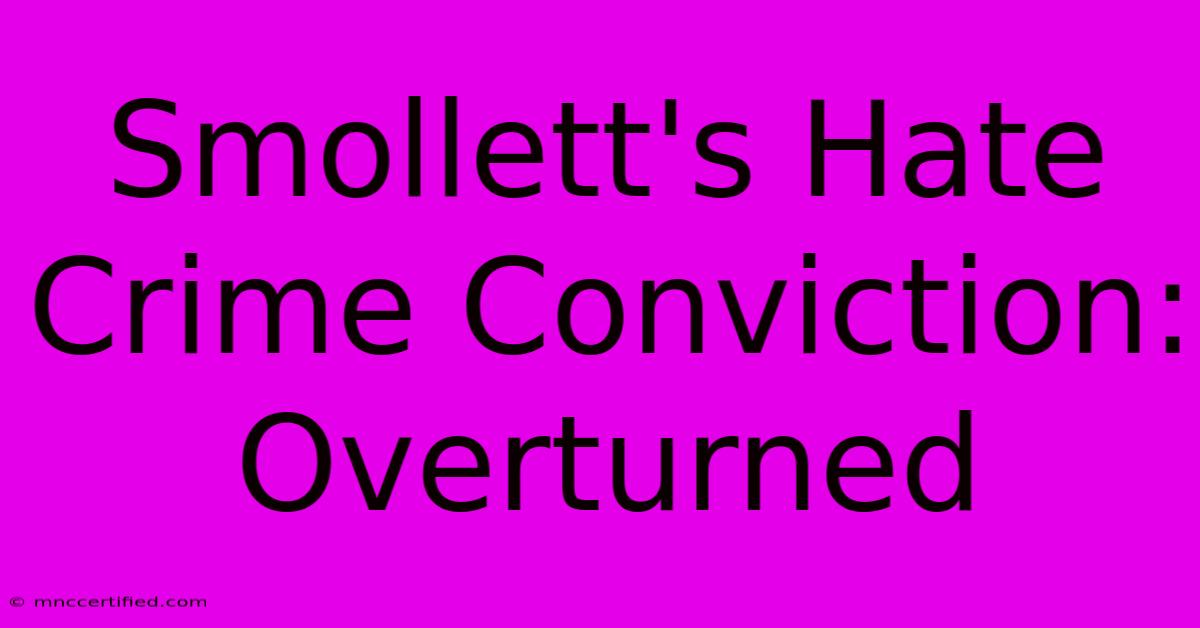Smollett's Hate Crime Conviction: Overturned

Table of Contents
Smollett's Hate Crime Conviction: Overturned – A Deeper Dive into the Case
Jussie Smollett, the actor known for his role in the television series Empire, saw his 2021 hate crime conviction overturned in March 2022. This decision sparked renewed debate about the complexities of the case, the justice system, and the power of public perception. This article delves into the key events, legal arguments, and implications of this controversial reversal.
The Original Accusations and Trial
In January 2019, Smollett reported to Chicago police that he had been the victim of a hate crime. He claimed two men attacked him, yelling racial and homophobic slurs, pouring bleach on him, and placing a rope around his neck. The incident immediately garnered significant media attention, with many viewing it as a disturbing example of rising hate crimes in the US.
However, the investigation took a dramatic turn. Police questioned Smollett's account, citing inconsistencies and a lack of corroborating evidence. He was subsequently charged with disorderly conduct for filing a false police report, a felony. The key argument against Smollett was that he had staged the entire attack himself. The trial centered around the credibility of witnesses, the evidence presented by the prosecution, and Smollett's own testimony. Ultimately, he was found guilty on five of the six counts against him.
The Overturning of the Conviction
Judge James Linn vacated Smollett's conviction, citing concerns about the impartiality of the special prosecutor, Dan Webb. The judge argued that the prosecution's selection of a jury, specifically excluding Black jurors, raised concerns about potential racial bias. He also pointed to Webb's extensive involvement in the case, suggesting it might have influenced the jury's decision. This decision was based on procedural irregularities rather than a finding of innocence on the underlying charges. The judge emphasized that the ruling did not exonerate Smollett, only that the conviction was obtained through flawed processes.
Procedural Irregularities: Key Arguments
The judge's decision hinged on what he saw as irregularities in the jury selection process and the potential for prosecutorial overreach. These procedural points became crucial to the overturning of the conviction, highlighting the importance of due process in the American legal system.
- Jury Selection: The judge took issue with the prosecution’s removal of several Black jurors, arguing that this raised concerns of racial bias, impacting Smollett's right to a fair trial.
- Special Prosecutor's Involvement: Judge Linn expressed concerns about the level of involvement of the special prosecutor, suggesting it might have unduly influenced the jury. The extensive nature of Webb's involvement and his potential conflicts of interest were questioned.
The Broader Implications
The overturning of Smollett's conviction has far-reaching implications, sparking intense debate about:
- The Power of Public Perception: The case underscored how easily public opinion, especially in the age of social media, can shape narratives and influence judicial outcomes.
- The Importance of Due Process: The ruling highlights the critical role of procedural fairness in the legal system, regardless of the perceived guilt or innocence of the accused.
- The Reporting of Hate Crimes: The case raises questions about the responsibility of reporting hate crimes, the scrutiny such reports face, and potential consequences for false accusations.
Conclusion: An Unresolved Chapter
The Smollett case remains a complex and controversial chapter in American jurisprudence. While the conviction has been overturned on procedural grounds, the questions surrounding the truthfulness of Smollett's initial claim persist. This case serves as a cautionary tale about the pitfalls of public opinion, the importance of due process, and the complexities of proving or disproving allegations of hate crimes. The legal battle, even after the conviction's overturning, continues to highlight the ongoing debates surrounding justice, race, and the media's role in shaping public perception. The full implications of this case are likely to continue unfolding for years to come.

Thank you for visiting our website wich cover about Smollett's Hate Crime Conviction: Overturned. We hope the information provided has been useful to you. Feel free to contact us if you have any questions or need further assistance. See you next time and dont miss to bookmark.
Featured Posts
-
I M A Celeb Coless Health News
Nov 22, 2024
-
Strictly Petes Unresolved Love Triangle
Nov 22, 2024
-
Austin Public Insurance Adjuster
Nov 22, 2024
-
Mar A Lago Trumps New Intel Briefings
Nov 22, 2024
-
Remembering Ken Reid Journalism Icon
Nov 22, 2024